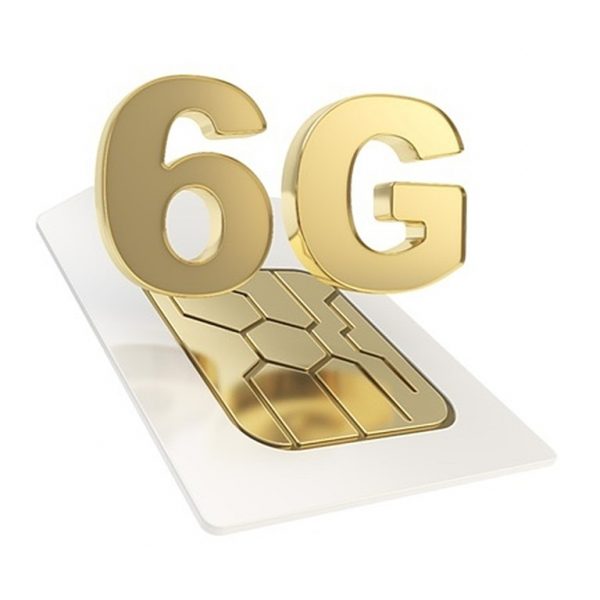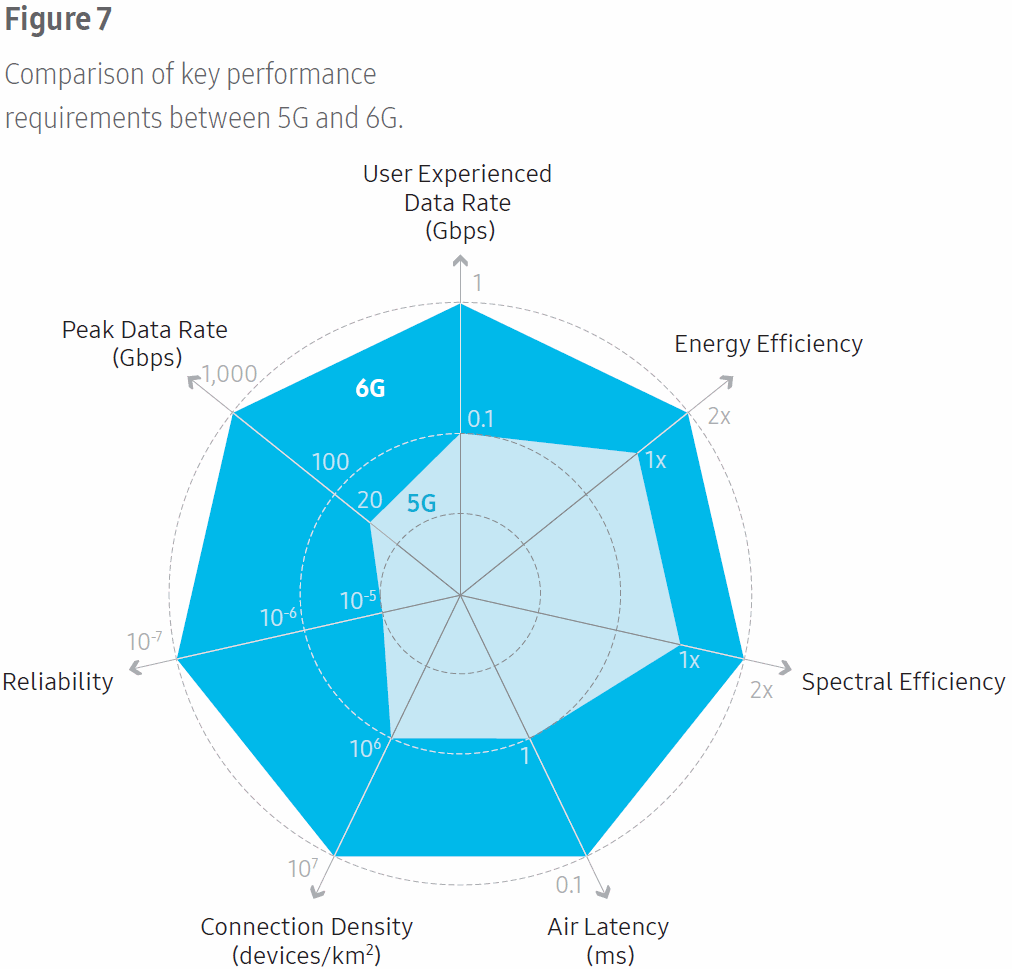Samsung Set 1Tbps Broadband Speed Target for Future 6G Mobile

South Korean tech giant Samsung has published a new White Paper that sets out its aspiration for a future 6th generation (6G) of mobile broadband technology, which among other things targets internet data speeds of 1Tbps (Terabits per second) and latency times of just 100 microseconds. Good luck with that.
We should start by saying that it’s somewhat of an industry tradition for the R&D of a new mobile technology to start right as the latest standard (5G) begins its first deployments. We saw it with 3G, we saw it again with 4G and now 5G, but this may surprise some people since 5G can harness an extremely wide range of radio spectrum frequencies and that doesn’t leave as much room for practical advancement (the key word there being.. practical).
In that sense Samsung’s White Paper – ‘6G The Next Hyper Connected Experience for All‘ – contains a predictable excess of hype about benefits for fields like AI technology, truly immersive extended reality (like virtual reality but with more hype), high-fidelity mobile holograms and digital replicas etc. However, we’ll ignore those because, frankly, this stuff always gets overinflated out of all proportion.
Advertisement
At the end of the day 6G is another evolution of mobile networking technology and, right now, that’s really all we need to understand. But before we get into that let’s just remind ourselves of what the latest 5G networks hope to achieve, eventually, in terms of data speeds and latency.
Existing 5G Performance Targets
* Minimum peak data rate target (shared between many users)
– Downlink 20 Gbit/s
– Uplink 10 Gbit/s* Target data rate for the user experienced in Dense Urban (eMBB) areas:
– Downlink 100 Mbit/s
– Uplink 50 Mbit/sNOTE: The target for rural performance is roughly half this.
* Minimum requirements for user latency:
– 4 ms for eMBB (Enhanced Mobile Broadband, such as in a normal mobile environment)
– 1 ms for URLLC (Ultra-reliable and low-latency communications, such as fixed wireless)
Take note that average 5G download speeds in the UK are already achieving around 138Mbps using just a 40-50MHz slice of the 3.4GHz band (example) and that’s before more spectrum is released for the technology to use. Suffice to say that there’s plenty of room left in the standard for advancement, much as we saw with 4G before it.
By comparison Samsung’s tentative design for 6G technology targets a peak downlink data rate of 1000Gbps (1Tbps), a user experienced data rate of 1Gbps (i.e. what you and I should expect), air latency of less than 100 μs (microseconds) and end-to-end (E2E) latency of less than 1ms (“with these requirements satisfied, the user experienced latency can be less than 10ms,” said Samsung).

Advertisement
In short, 6G technology should be incredibly fast and the idea of making 1Gbps speeds somewhat of a normal expectation for end-users is more than a little attractive. In order to achieve this Samsung proposes all sorts of network efficiency improvements, enhanced use of Orbital Angular Momentum (OAM), new antenna designs, mesh networking, improvements to Duplex technology and the idea of harnessing the Terahertz (THz) bands – these sit in the range of 100GHz to 10THz.
At this point anybody familiar with some of 5G’s plans for the use of much higher frequencies around 23GHz to 100GHz will immediately recognise that age old dilemma with the laws of physics vs economic reality. At present only a few 5G networks have harnessed bands above 23GHz, and usually only in busy areas (shopping markets etc.) or for fixed wireless style links, because such signals are extremely weak and thus don’t travel as far.
Put another way, you can get a lot of extra spectrum frequency for achieving massive data speeds by going into those higher frequency bands. However, the use cases diminish because, in return, the signal coverage is very poor without investing in a much denser and more complicated network deployment (very expensive). So far mobile operators, particularly in the UK, have shown little desire to go down that path for wide-scale coverage.
The addition of the Terahertz band is thus not a magic fix for extra mobile performance in the real-world, although many of the other improvements that Samsung propose do have plenty of merit.
Advertisement
Sunghyun Choi, Samsung’s Head of the Advanced Communications, said:
“While 5G commercialization is still in its initial stage, it’s never too early to start preparing for 6G because it typically takes around 10 years from the start of research to commercialization of a new generation of communications technology.
We’ve already launched the research and development of 6G technologies by building upon the experience and ability we have accumulated from working on multiple generations of communications technology, including 5G. Going forward, we are committed to leading the standardization of 6G in collaboration with various stakeholders across industry, academia and government fields.”
The report predicts that the ITU-R will begin early work to construct a standard for 6G in 2021 and this could be completed “as early as” 2028, with commercial deployments following by around 2030. All of that seems reasonable.
Mark is a professional technology writer, IT consultant and computer engineer from Dorset (England), he also founded ISPreview in 1999 and enjoys analysing the latest telecoms and broadband developments. Find me on X (Twitter), Mastodon, Facebook, BlueSky, Threads.net and Linkedin.
« Fixed Broadband Growth Slows as Global Subscribers Top 1.13bn






















































Thanks @Mark Jackson for that headline grabbing excitement, how to burst one’s balloon with the well balanced facts, we might get close to that in say 15 to 20 years, by then ill be even more of a doddery old fool!
Tend to agree with you there Chris. It don’t matter “How fast” a technology can be, What matters is that the carriers have enough spectrum or are willing to invest in the needed amount of backbone either. Currently they don’t for either.
So with the cost of data delivery to/from backbone providers being so high the ludicrous suggestion of 1Tbps to your phone/home is laughable at best.
Not to mention we’ll need a faster networking interface inside home based hardware just to cope with those sorts of speeds. Quantum home PC’s anyone?
And how many SSD’s today can read and write at this speed? The theoretical max sequential write speed for PCIe 3.0 x4 drives is 3,700MBps currently.
Pipe dream from Samsung, me thinks. Maybe in 25 years!
@Buggerlugz – you need to get with the times!
There are already 7.5GB/sec NVMe PCIe 4.0 SSD’s available, and PCI-E V5 is set to launch next year, which will double the speed yet again.
Times move quickly my friend, best read up (google) before sprouting nonsense on public forums.
“And how many SSD’s today can read and write at this speed? The theoretical max sequential write speed for PCIe 3.0 x4 drives is 3,700MBps currently”
There are literally dozens of PCIE 4.0 drives out there now, some at a low as £100-£200 that hit over 8Gb/s.
There’s enterprise PCIE 4.0 x16 hard drives that can hit 15Gb/s.
My Corsair Force MP600 is faster than the 3,700Mb/s that you think is the current theoretical max.
It’s advertised as 4,950Mb/s though I get a little less than that as the headline figure in benchmarks.
Random read/writes are nowhere near that obviously.
We’re gonna need a bigger and denser tin hat for the brigade…
@Sandra
The tin foil hat brigade already seem pretty dense to me!
Just think what 6g will do to your brain, especially if you’re wearing a tin foil hat! Frightening thought!
*checks calendar*
Nope, not April 1st.
Might as well be. 🙂 Made me chuckle!
Reminds me of when the factory I worked for was US owned, many initiative’s issued by central directive but none ever finished before the next one arrived diverting resource’s. They have not got 4G working and now are off on a 5G rollout that degrade’s 4G even further.
Good point John. Carriers are sacrificing 4g bandwidth to make their 5g viable, so to even suggest the world should go down the 6g rabbit hole is Alice in wonderland mad hatter stuff.
I think it’s too soon to think about sixth generation of cellular technology.
Especially when 5G-NR is capable of so much [connected cars, real time info on parking spaces etc…]
There was a lot of life left in HSPA+ [3.9G]
as it was capable of real world speeds of around 42mbps Dwnld. But LTE was all the rage.
So many more thoughts but not one for long posts!
We should focus on the next step like 5G+ / 5.5G / 5.9G before 6G.
Samsung need to be putting all their eggs in the current 5g basket not venturing into fairytale lands of 6g at the moment. With Huawei “out the wei” they can soak up the 5g market. Good luck to them in that venture!